|
|
|
Sort Order |
|
|
|
Items / Page
|
|
|
|
|
|
|
| Srl | Item |
| 1 |
ID:
147457
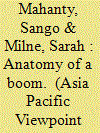

|
|
|
|
|
| Summary/Abstract |
This paper examines how a boom in industrial cassava served as a ‘gateway’ to intensify capitalist relations in Cambodia's north eastern borderland. Situated on Cambodia's border with Vietnam, Mondulkiri province has experienced a rapid increase in cassava production and trade since 2006, with transformative consequences for the region's forests and farmers. Using field data from 2012 to 2014, we explore how the boom ignited and intensified over time, through a conjuncture of conditions. Alongside strong market demand for cassava, these included resource abundance (soil fertility, timber, land, labour), connectivity to markets and cross border networks, and facilitative governance conditions. Over time, the boom strengthened capitalist relations, particularly through farmer debt and the revalorisation and accumulation of land. However, unlike booms of tree crops elsewhere, we argue that it is the very impermanence of cassava that is formative here, because the crop's short-term nature and low overheads facilitate practices like land laundering and land mortgaging. Like the ‘gateway drugs’ that were believed to place users on a path to addiction and risk, this paper shows that gateway crops such as cassava may similarly place farmers on a trajectory of more intense competition and reduced choice in their engagements with capitalist modes of production.
|
|
|
|
|
|
|
|
|
|
|
|
|
|
|
|
| 2 |
ID:
172453
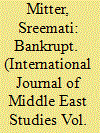

|
|
|
|
|
| Summary/Abstract |
In the late 1930s, the first independent Arab banks in Palestine, the Arab Bank and the Arab Agricultural Bank, sued customers who had defaulted on loans in an attempt to maintain solvency. Their indebted customers, unable to pay, fought back to prevent their lands from being foreclosed and sold to Zionist buyers. Each party claimed that its position was consistent with, indeed essential to, the anti-Zionist nationalist cause. The story of these pioneering Arab banks and their legal battles with their customers in the wake of the 1936-1939 revolt provides insight into Arab financial life in Mandate Palestine. It reveals the banks’ struggles to survive; complicates notions of Arab-Palestinian landlessness and indebtedness; and argues that political and economic exigencies, not reductive notions of collaboration or patriotism, produced the banks’ antagonistic relationship with their customers, whereby the survival of one came at the expense of the other.
|
|
|
|
|
|
|
|
|
|
|
|
|
|
|
|
| 3 |
ID:
107040
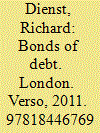

|
|
|
|
|
| Publication |
London, VERSO, 2011.
|
| Description |
192p.
|
| Standard Number |
9781844676910, hbk
|
|
|
|
|
|
|
|
|
|
|
|
Copies: C:1/I:0,R:0,Q:0
Circulation
| Accession# | Call# | Current Location | Status | Policy | Location |
| 056197 | 336.3460973/DIE 056197 | Main | On Shelf | General | |
|
|
|
|
| 4 |
ID:
161401
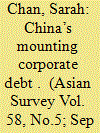

|
|
|
|
|
| Summary/Abstract |
China’s corporate debt has risen sharply since the 2008–09 global financial crisis, although the pace of growth has somewhat moderated due to the authorities’ recent financial deleveraging efforts and regulatory tightening. To address the surging debt problem and elevated corporate leverage, comprehensive structural reforms in the corporate, financial, and fiscal sectors are necessary.
|
|
|
|
|
|
|
|
|
|
|
|
|
|
|
|
| 5 |
ID:
163510


|
|
|
|
|
| Summary/Abstract |
Local governments in China have used a large amount of funds from individual accounts to finance deficits in the pay-as-you-go social pooling account, resulting in explicit social security debt. It is undoubtedly useful to know how large the debt is and how it will evolve in the future. This paper assesses the debt in China's social security individual accounts. It shows detailed calculations of the revenue, the anticipated funds, expenditures, and the debt in the individual accounts since their inception in 1997. The social security debt for China reached 1.59% of the GDP in 2015. The paper also assesses the historical social security debt in the individual accounts for each province. It shows that social security debt is unevenly spread, reaching more than 10% in Heilongjiang province and being negative in Guangdong province in 2015. The determinants for high debt in the individual accounts are examined based on the data from thirty-one Chinese provinces from 1997 to 2015. The paper also forecasts social security debt in the future and finds that the social security debt will reach over 8% of GDP in 2025 if the current system remains unchanged. Various ways to reduce the social security debt are also explored.
|
|
|
|
|
|
|
|
|
|
|
|
|
|
|
|
| 6 |
ID:
189713
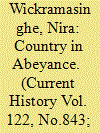

|
|
|
|
|
| Summary/Abstract |
Amid an economic meltdown in 2022, a nonviolent citizens movement in Sri Lanka ousted Prime Minister Mahinda Rajapaksa and President Gotabaya Rajapaksa, brothers from a family that had dominated national politics since 2005. But Parliament filled the presidential vacancy with Ranil Wickremesinghe, a six-time former prime minister seen as a proxy for his predecessors. After a draconian crackdown on protesters, the streets have quieted. But the country’s underlying economic and political crisis, which has roots in the early postcolonial period and the civil war, and was worsened by the Rajapaksas’ autocratic misrule, persists. The new administration has avoided the systemic change demanded by protesters.
|
|
|
|
|
|
|
|
|
|
|
|
|
|
|
|
| 7 |
ID:
191179
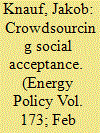

|
|
|
|
|
| Summary/Abstract |
Citizen co-investment in wind energy projects has recently received a lot of attention among scholars and policymakers as a way to finance renewable energy projects and increase community acceptance of these projects. Citizen co-investment refers to the process by which members of the local community can financially participate in renewable energy projects prior to or shortly after construction. While previous research has often been cross-sectional and focused on the preferences of citizen-investors, this paper focuses on the perspective of project developers and asks why, when and how they offer citizens the opportunity to co-invest in wind farms. The work is based on the analysis of fourteen in-depth interviews with a sample of experienced German wind energy developers. The analysis shows that the decision to offer co-investment is driven by citizen demand and local stakeholder preferences, rather than financial needs. We shed light on how experienced developers deal with key trade-offs in terms of the timing of their offering and the choice of capital structure. As a result, we offer a number of testable propositions for further research on the nuanced relationship between citizen co-investment and social acceptance and derive recommendations for policymakers.
|
|
|
|
|
|
|
|
|
|
|
|
|
|
|
|
| 8 |
ID:
078890
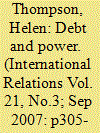

|
|
|
|
|
| Publication |
2007.
|
| Summary/Abstract |
The United States' borrowing poses a potential threat to its long-term external power. This is not because the United States' fiscal debt is large in relative terms, or because rising debt necessarily threatens a state's power, but because the United States has now indebted itself to China, and this financial relationship fundamentally changes the political terms on which the United States has borrowed since the 1960s. The consequences of that change may force American presidents to consider questions about the domestic viability of their foreign policy in a way that has not been necessary since the beginnings of the Cold War. Neither liberals nor realists are equipped to understand the significance of this change, because of the way in which they conceive power in relation to the interaction between domestic and international politics.
|
|
|
|
|
|
|
|
|
|
|
|
|
|
|
|
| 9 |
ID:
144627
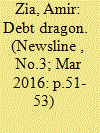

|
|
|
| 10 |
ID:
109238
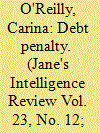

|
|
|
| 11 |
ID:
083228


|
|
|
|
|
| Publication |
2008.
|
| Summary/Abstract |
Fiji's total debt stands at 65% of GDP. Domestic debt constitutes 55% of GDP. The goal of this paper is to investigate whether military expenditure has contributed to Fiji's exploding debt levels over the period 1970 to 2005. Our empirical analysis, conducted within a cointegration and vector error-correction framework, suggests that, in the long-run, military expenditure has had a statistically significant positive impact on both external debt and domestic debt, while income has had a statistically significant positive impact on domestic debt and a statistically significant negative impact on external debt. We explain the reasons behind this finding and draw some policy implications.
|
|
|
|
|
|
|
|
|
|
|
|
|
|
|
|
| 12 |
ID:
121866
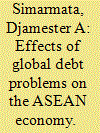

|
|
|
|
|
| Publication |
2013.
|
| Summary/Abstract |
The Global Financial Crisis and the subsequent eurozone crisis magnified the large debt accumulated by developed countries, particularly the United States. There have been several stimulus attempts in the form of quantitative easing in both the United States and in Europe. However, the results have not been satisfactory. Limited growth in the developed regions will have an impact on ASEAN due to its dependency on exports. At present, ASEAN intercountry trade is low and is therefore unable to substitute for the loss of exports to developed economies. Thus, a new paradigm has to be created to provide other avenues of growth. The most probable drivers of growth come from two sources: empowering domestic consumers to boost consumption and spending; and intensifying trade with other countries in the region. The former policy should be designed in a manner where a rise in local demand will not trigger a price hike attributable to an increase in the unit cost of production. The latter policy should stimulate trade flows in the region through the provision of additional infrastructure, as the current foundation is insufficient.
|
|
|
|
|
|
|
|
|
|
|
|
|
|
|
|
| 13 |
ID:
154478
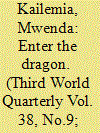

|
|
|
|
|
| Summary/Abstract |
This article draws on the theory and recent research on ‘ecological disorganization’- defined as ‘the ways in which human preferences for organizing economic production consistent with the objectives of capitalism are an inherent contradiction with the health of the ecological system’- to explore the ‘corporate violence’ apropos of Chinese investment in Africa. In line with other ecological disorganization theorists, we show how the deployment of Chinese capital in Africa structures and reproduces subjectivation, but also how, ultimately, this subjectivation is implicated in Africa’s ecological disorganization.
|
|
|
|
|
|
|
|
|
|
|
|
|
|
|
|
| 14 |
ID:
135075
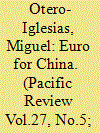

|
|
|
|
|
| Summary/Abstract |
The aim of this paper is to analyze China's strategy in relation to the euro. The first section summarizes China's active support to the single currency since its creation up to the first phase of the current Eurozone debt crisis. It shows how China has used a two-pronged approach. It has developed a public campaign in favor of the euro, especially when the market sentiment has been bearish on the single currency, and it has continued to be an active player in the European sovereign debt markets. The second part explains why China has been so supportive. Beijing wants to move away from dollar hegemony and thus it favors a tripolar monetary system based on the US dollar, the euro and the Chinese renminbi (RMB). With this aim, and despite the crisis, China has continued to diversify its foreign reserves into the euro making it by now ‘too important to fail’, not only because China holds roughly $1 trillion in euro-denominated assets, but also because for China the Eurozone is a crucial market and an important strategic counterweight to US dominance in world affairs. Finally, the third part focuses on how by the end of 2011 China switches to a more cautious approach due to the difficulty involved in rescuing the Eurozone. Domestic pressures, public outcry in Europe against being saved by China, the unwillingness of the European leaders to enter into strategic bargaining and Germany's strategy to use sovereign bond spreads as a market mechanism to create ‘more Europe’ have convinced policy-makers in Beijing to keep a lower profile while making sure the value of the euro remains stable.
|
|
|
|
|
|
|
|
|
|
|
|
|
|
|
|
| 15 |
ID:
124209
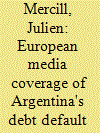

|
|
|
|
|
| Publication |
2013.
|
| Summary/Abstract |
In 2001 Argentina defaulted on its debts and then devalued its currency by abandoning the peso-dollar peg. The economy rebounded and has grown relatively strongly since then. This paper uses a critical political economy approach to first show that the Argentinian strategy finds support in the literature examining the effects of sovereign debt default, currency devaluation and fiscal consolidation on economic growth. Argentina is thus relevant to Europe's ongoing crisis. The article then investigates European media coverage of the Argentinian experience through an examination of major newspapers' stories between 2008 and 2013. It argues that the media have distorted the lessons of the Argentinian recovery by focusing on the negative consequences of default rather than its benefits; by emphasising the role of rising commodity export prices over domestic policy decisions in stimulating the economy; by opposing some aspects of government intervention in the economy even if the latter played a beneficial role; and by exaggerating the negative consequences of inflation. This distorted coverage is explained through reference to the media's ideological role in the implementation of austerity policies in Europe.
|
|
|
|
|
|
|
|
|
|
|
|
|
|
|
|
| 16 |
ID:
161486
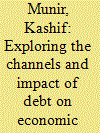

|
|
|
|
|
| Summary/Abstract |
The objective of this study is to analyse the effect of debt on economic growth as well as the channels, that is, investment, total factor productivity (TFP), interest rate and saving channel through which debt affects economic growth in South Asian countries. The study uses growth model based on conditional convergence and augments to include debt. Panel data of four South Asian countries from 1990 to 2013 at annual frequency are utilized and fixed effect model is used for estimation. The results of the study showed that inverted U-shaped relationship exists between debt and economic growth in South Asian countries. However, the most important and significant channel through which debt affects economic growth is private and public investment as well as TFP. Reducing debt accumulation alone will not rectify the problem unless the supplementary macroeconomic policies are made sound; therefore, there is a dire need to improve macroeconomic policies, good governance and elimination of structural distortions.
|
|
|
|
|
|
|
|
|
|
|
|
|
|
|
|
| 17 |
ID:
160845


|
|
|
|
|
| Summary/Abstract |
Considering that debt has become a pervasive feature of contemporary life in Mongolia, this article calls for a nuanced examination of the diversity of current debt relations as evinced through its multiple moral interpretations and social effects. Through case studies of moneylenders in contemporary Dornod Province, I discuss (1) how local actors perceive multiple moralities and types of debt (e.g. formal and informal/kinship); (2) how moneylenders comprise an occupational role as ‘translators’ between these different registers; and thus (3) how they allow local debtor actors to navigate their debt load by moving money between the varying registers. By mobilizing local forms of social value, moneylenders create financial value that supports and enables bank debt. As a result, the moralities and logics of finance have increasingly pervaded aspects of local social relations in the collateralization of social standing and the designation of interest payment as a form of community assistance.
|
|
|
|
|
|
|
|
|
|
|
|
|
|
|
|
| 18 |
ID:
167581
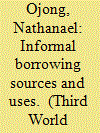

|
|
|
|
|
| Summary/Abstract |
This article seeks to analyse the informal borrowing sources of the poor as well as the purposes for borrowing. The obsession on characterising the poor as financially excluded fails to grasp their active financial lives. This article emphasises how relations of credit/debt are rooted in complex social and cultural forces. It is precisely because of the social embeddedness of credit that family finance, though interest-free, is not a first resort. Similarly, credit in kind from shopkeepers, though critical to consumption smoothing, is detested by some people. Also, it is argued that the involvement of the traditional leader in repayment enforcement in informal financial groups challenges the economistic narrative that attempts to separate credit from cultural norms.
|
|
|
|
|
|
|
|
|
|
|
|
|
|
|
|
| 19 |
ID:
121861
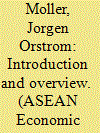

|
|
|
|
|
| Publication |
2013.
|
| Summary/Abstract |
The global debt crisis will keep the world economy in a straitjacket for some time and reinforce the shift from established economic powers to Asia. Debt needs to be repaid in the form of lower consumption and the deleveraging process for the G-3 (the United States, the eurozone, and Japan, who have reached an unprecedented level of debt), still has a long way to go. The United States opted for fiscal and monetary stimulus, the eurozone chose austerity, and Japan after some hesitation started to pump money into the economy. It remains to be seen whether the divergence in policies will constitute a barrier for a global recovery. Southeast Asia has so far managed quite well because the lesson was learned in 1997-98 and signs of strong borrowing have been detected only recently. The main problem seems to be how to plug into a new and amended global financial system that has emerged in response to flaws that were identified when the crisis struck.
|
|
|
|
|
|
|
|
|
|
|
|
|
|
|
|
| 20 |
ID:
124219
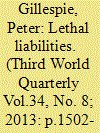

|
|
|
|
|
| Publication |
2013.
|
| Summary/Abstract |
In the mid-1980s I had the opportunity to work with the National Federation of Sugar Workers, the union of sugar plantation workers in the Philippines. It was a desperate period in Negros Occidental, the main sugar-producing island. Sugar prices had fallen worldwide. The end of a preferential trade agreement with the USA had resulted in a dramatic decline of sugar exports to the American market. The economy of Negros had collapsed. Starvation among workers and their families was setting in .
|
|
|
|
|
|
|
|
|
|
|
|
|
|
|
|
|
|
|
|
|